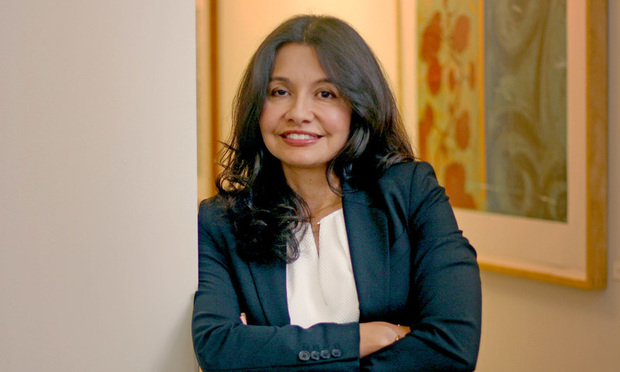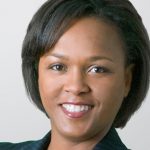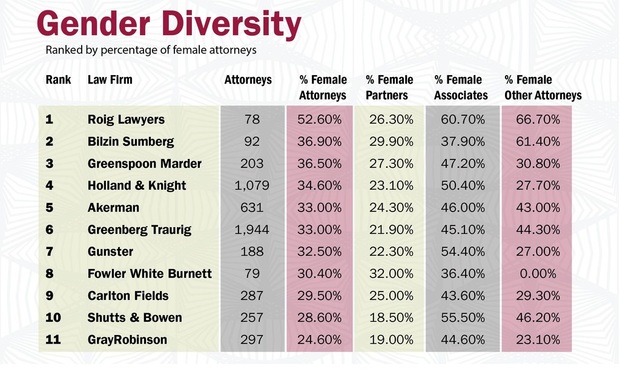Focus on Inclusion Feed Minority, Gender Diversity at Law Firms in Florida
Deerfield Beach-based Roig Lawyers comes out on top for women and minority attorneys.
July 23, 2018 at 06:00 AM
7 minute read
 Senior attorneys who've given some thought to questions of inclusion at a number of AmLaw 100 firms in Miami agree: Most of the diversity in large firms is at their lower levels. That goes for both women and ethnic and racial minorities. “I have seen so many women that are talented and so many people of color leave the AmLaw 100 because of perceived barriers that are really a lack of inclusiveness that allows them to feel nurtured and satisfied within their careers,” said Duane Morris partner Lida Rodriguez-Taseff in Miami.
Senior attorneys who've given some thought to questions of inclusion at a number of AmLaw 100 firms in Miami agree: Most of the diversity in large firms is at their lower levels. That goes for both women and ethnic and racial minorities. “I have seen so many women that are talented and so many people of color leave the AmLaw 100 because of perceived barriers that are really a lack of inclusiveness that allows them to feel nurtured and satisfied within their careers,” said Duane Morris partner Lida Rodriguez-Taseff in Miami.  It's not that these firms aren't trying. Tiffani Lee serves as firmwide diversity partner for Holland & Knight. When she started in the position several years back, Lee's managing partner told her, “I want to focus on results, not rhetoric.” What will drive results? For one, it's giving greater attention to teaching female and minority attorneys the sort of business development skills that will more easily make them partner. It's also embracing ideas from outside organizations like the Diversity Lab, the idea incubator behind the Mansfield Rule. Now starting its second year, the initiative measures whether participating firms are considering women, minority — and in 2018 for the first time, LGBTQ — candidates for leadership positions. Clients are also increasingly demanding clear signs of improvement. “The institutional clients all have initiatives surrounding who has diverse counsel,” said Akerman chairman and CEO David Spector. “It's something AmLaw 100 firms like ours are used to. It's not going away, and it shouldn't.” Lee, who's also in Miami, noticed outside counsel have been nudging firms in recent years to be more creative in taking on the issue. Rather than filling out surveys, firms are invited to attend symposia. Some clients have latched onto research that shows sponsorship — a support mechanism that goes beyond mentorship — is the No. 1 factor determining whether someone succeeds in a professional services firm. One even mandated the installation of a client-approved sponsorship program by the end of 2017 with noncompliance meaning suspension from the company's panel of outside counsel. “From my standpoint, it was a really courageous thing,” Lee said. most diverse states in the country They look around at the demographics of the markets in which they are based, and they see the same thing we see, especially if they're consumer facing," she said. "The face of the American consumer is changing, and they want to respond to that."
It's not that these firms aren't trying. Tiffani Lee serves as firmwide diversity partner for Holland & Knight. When she started in the position several years back, Lee's managing partner told her, “I want to focus on results, not rhetoric.” What will drive results? For one, it's giving greater attention to teaching female and minority attorneys the sort of business development skills that will more easily make them partner. It's also embracing ideas from outside organizations like the Diversity Lab, the idea incubator behind the Mansfield Rule. Now starting its second year, the initiative measures whether participating firms are considering women, minority — and in 2018 for the first time, LGBTQ — candidates for leadership positions. Clients are also increasingly demanding clear signs of improvement. “The institutional clients all have initiatives surrounding who has diverse counsel,” said Akerman chairman and CEO David Spector. “It's something AmLaw 100 firms like ours are used to. It's not going away, and it shouldn't.” Lee, who's also in Miami, noticed outside counsel have been nudging firms in recent years to be more creative in taking on the issue. Rather than filling out surveys, firms are invited to attend symposia. Some clients have latched onto research that shows sponsorship — a support mechanism that goes beyond mentorship — is the No. 1 factor determining whether someone succeeds in a professional services firm. One even mandated the installation of a client-approved sponsorship program by the end of 2017 with noncompliance meaning suspension from the company's panel of outside counsel. “From my standpoint, it was a really courageous thing,” Lee said. most diverse states in the country They look around at the demographics of the markets in which they are based, and they see the same thing we see, especially if they're consumer facing," she said. "The face of the American consumer is changing, and they want to respond to that." Minority Attorneys
With Hispanics making up 69 percent of the Miami-Dade County population, it's not surprising that many law firms with South Florida offices show impressive outcomes when it comes to ethnic diversity. Roig Lawyers is a minority-owned firm with its main office in Deerfield Beach and a presence in Miami and five other Florida locales. About 41 percent of its 78 attorneys are minorities, while 37 percent of partners are minorities. “You have to remember that with Miami-Dade County, we are a melting pot. You have so many different ethnic backgrounds and people from different countries,” said Miami attorney Julie Harris Nelson, the sole African-American female partner at the firm. There are certain opportunities that you have with a large office in Miami with a large international presence and an international practice that increases your ability to be diverse," he said. "But New York, Texas, Chicago all draw from a diverse pool. I don't think that the trends in Florida are any different from anywhere else in the country." you're going to the local schools, the creme de la creme, it gets pre-selected very quickly. It's a sign that our peers are also taking this very seriously."
“You have to remember that with Miami-Dade County, we are a melting pot. You have so many different ethnic backgrounds and people from different countries,” said Miami attorney Julie Harris Nelson, the sole African-American female partner at the firm. There are certain opportunities that you have with a large office in Miami with a large international presence and an international practice that increases your ability to be diverse," he said. "But New York, Texas, Chicago all draw from a diverse pool. I don't think that the trends in Florida are any different from anywhere else in the country." you're going to the local schools, the creme de la creme, it gets pre-selected very quickly. It's a sign that our peers are also taking this very seriously." Gender Diversity
 When I started, there weren't any younger female shareholders," said Rodz, who was 37 when she became the firm's first Hispanic female partner in 2007. "From then, the doors have opened to the incredible talent that's out there." contested election I think that is an indicator that lawyers as a whole, and not just law firm leaders, are recognizing the importance of putting female lawyers in power," Rodriguez-Taseff said. managing partner of Foley & Lardner's Miami office I would like to think its because the numbers of women staying long-term in the law is increasing," she said. "It's partly that our time has come. Perhaps it's overdue." I hope that a positive byproduct of the MeToo movement is that the traditionally male leadership at law firms are really beginning to think intentionally about this issue," Smith said. " It's certainly sparked a lot of conversations at these places."
When I started, there weren't any younger female shareholders," said Rodz, who was 37 when she became the firm's first Hispanic female partner in 2007. "From then, the doors have opened to the incredible talent that's out there." contested election I think that is an indicator that lawyers as a whole, and not just law firm leaders, are recognizing the importance of putting female lawyers in power," Rodriguez-Taseff said. managing partner of Foley & Lardner's Miami office I would like to think its because the numbers of women staying long-term in the law is increasing," she said. "It's partly that our time has come. Perhaps it's overdue." I hope that a positive byproduct of the MeToo movement is that the traditionally male leadership at law firms are really beginning to think intentionally about this issue," Smith said. " It's certainly sparked a lot of conversations at these places." LGBT Inclusion
 Miami's Bilzin Sumberg, which landed on top for LGBT inclusion, has a mathematical advantage: it was the smallest firm to complete the survey. But with six LGBT attorneys, it is home to double the number that work at several Florida firms twice its size. And five of the LGBT lawyers are partners, a considerable figure for a 92-attorney firm.
Miami's Bilzin Sumberg, which landed on top for LGBT inclusion, has a mathematical advantage: it was the smallest firm to complete the survey. But with six LGBT attorneys, it is home to double the number that work at several Florida firms twice its size. And five of the LGBT lawyers are partners, a considerable figure for a 92-attorney firm.  Partner Brian Adler, himself a member of the LGBT community, said the firm works hard to make it a welcoming place. It has been hosting a yearly networking session with OUTLaw, the University of Miami law school's LGBT awareness group, for five years. It's also one of the few single-office law firms that sends representatives to the Lavender Law career fair, the National LGBT Bar Association's annual hiring event. Adler said the firm also encourages attorneys to take leadership roles in community organizations. He sits on the board of SAVE, South Florida's leading organization for protecting the rights of people who are lesbian, gay, bisexual, transgender and queer. These efforts, taken together, send a message to prospective and incoming attorneys. “Often, you don't know the firm's culture with regard to certain minorities,” he said. “Here, there is no guessing. You don't have to dig very deep to know our stance on inclusion.” Adler acknowledged the firm's size made it easier for him and others to personally reach out and make newly hired diverse attorneys feel at home, but he argued the spirit of openness would continue even with further growth. “I think it's something that's endemic in the attitude we have,” he said. “I can't see that changing whether its a 100-person firm or a 500-person firm.”
Partner Brian Adler, himself a member of the LGBT community, said the firm works hard to make it a welcoming place. It has been hosting a yearly networking session with OUTLaw, the University of Miami law school's LGBT awareness group, for five years. It's also one of the few single-office law firms that sends representatives to the Lavender Law career fair, the National LGBT Bar Association's annual hiring event. Adler said the firm also encourages attorneys to take leadership roles in community organizations. He sits on the board of SAVE, South Florida's leading organization for protecting the rights of people who are lesbian, gay, bisexual, transgender and queer. These efforts, taken together, send a message to prospective and incoming attorneys. “Often, you don't know the firm's culture with regard to certain minorities,” he said. “Here, there is no guessing. You don't have to dig very deep to know our stance on inclusion.” Adler acknowledged the firm's size made it easier for him and others to personally reach out and make newly hired diverse attorneys feel at home, but he argued the spirit of openness would continue even with further growth. “I think it's something that's endemic in the attitude we have,” he said. “I can't see that changing whether its a 100-person firm or a 500-person firm.” This content has been archived. It is available through our partners, LexisNexis® and Bloomberg Law.
To view this content, please continue to their sites.
Not a Lexis Subscriber?
Subscribe Now
Not a Bloomberg Law Subscriber?
Subscribe Now
NOT FOR REPRINT
© 2025 ALM Global, LLC, All Rights Reserved. Request academic re-use from www.copyright.com. All other uses, submit a request to [email protected]. For more information visit Asset & Logo Licensing.
You Might Like
View All
SEC Whistleblower Program: What to Expect Under the Trump Administration
6 minute read
Turning the Shock of a January Marital Split Into Effective Strategies for Your Well-Being
5 minute read
Latest Boutique Combination in Florida Continues Am Law 200 Merger Activity
3 minute read
South Florida Real Estate Lawyers See More Deals Flow, But Concerns Linger
6 minute readTrending Stories
- 1Public Notices/Calendars
- 2Wednesday Newspaper
- 3Decision of the Day: Qui Tam Relators Do Not Plausibly Claim Firm Avoided Tax Obligations Through Visa Applications, Circuit Finds
- 4Judicial Ethics Opinion 24-116
- 5Big Law Firms Sheppard Mullin, Morgan Lewis and Baker Botts Add Partners in Houston
Who Got The Work
J. Brugh Lower of Gibbons has entered an appearance for industrial equipment supplier Devco Corporation in a pending trademark infringement lawsuit. The suit, accusing the defendant of selling knock-off Graco products, was filed Dec. 18 in New Jersey District Court by Rivkin Radler on behalf of Graco Inc. and Graco Minnesota. The case, assigned to U.S. District Judge Zahid N. Quraishi, is 3:24-cv-11294, Graco Inc. et al v. Devco Corporation.
Who Got The Work
Rebecca Maller-Stein and Kent A. Yalowitz of Arnold & Porter Kaye Scholer have entered their appearances for Hanaco Venture Capital and its executives, Lior Prosor and David Frankel, in a pending securities lawsuit. The action, filed on Dec. 24 in New York Southern District Court by Zell, Aron & Co. on behalf of Goldeneye Advisors, accuses the defendants of negligently and fraudulently managing the plaintiff's $1 million investment. The case, assigned to U.S. District Judge Vernon S. Broderick, is 1:24-cv-09918, Goldeneye Advisors, LLC v. Hanaco Venture Capital, Ltd. et al.
Who Got The Work
Attorneys from A&O Shearman has stepped in as defense counsel for Toronto-Dominion Bank and other defendants in a pending securities class action. The suit, filed Dec. 11 in New York Southern District Court by Bleichmar Fonti & Auld, accuses the defendants of concealing the bank's 'pervasive' deficiencies in regards to its compliance with the Bank Secrecy Act and the quality of its anti-money laundering controls. The case, assigned to U.S. District Judge Arun Subramanian, is 1:24-cv-09445, Gonzalez v. The Toronto-Dominion Bank et al.
Who Got The Work
Crown Castle International, a Pennsylvania company providing shared communications infrastructure, has turned to Luke D. Wolf of Gordon Rees Scully Mansukhani to fend off a pending breach-of-contract lawsuit. The court action, filed Nov. 25 in Michigan Eastern District Court by Hooper Hathaway PC on behalf of The Town Residences LLC, accuses Crown Castle of failing to transfer approximately $30,000 in utility payments from T-Mobile in breach of a roof-top lease and assignment agreement. The case, assigned to U.S. District Judge Susan K. Declercq, is 2:24-cv-13131, The Town Residences LLC v. T-Mobile US, Inc. et al.
Who Got The Work
Wilfred P. Coronato and Daniel M. Schwartz of McCarter & English have stepped in as defense counsel to Electrolux Home Products Inc. in a pending product liability lawsuit. The court action, filed Nov. 26 in New York Eastern District Court by Poulos Lopiccolo PC and Nagel Rice LLP on behalf of David Stern, alleges that the defendant's refrigerators’ drawers and shelving repeatedly break and fall apart within months after purchase. The case, assigned to U.S. District Judge Joan M. Azrack, is 2:24-cv-08204, Stern v. Electrolux Home Products, Inc.
Featured Firms
Law Offices of Gary Martin Hays & Associates, P.C.
(470) 294-1674
Law Offices of Mark E. Salomone
(857) 444-6468
Smith & Hassler
(713) 739-1250






